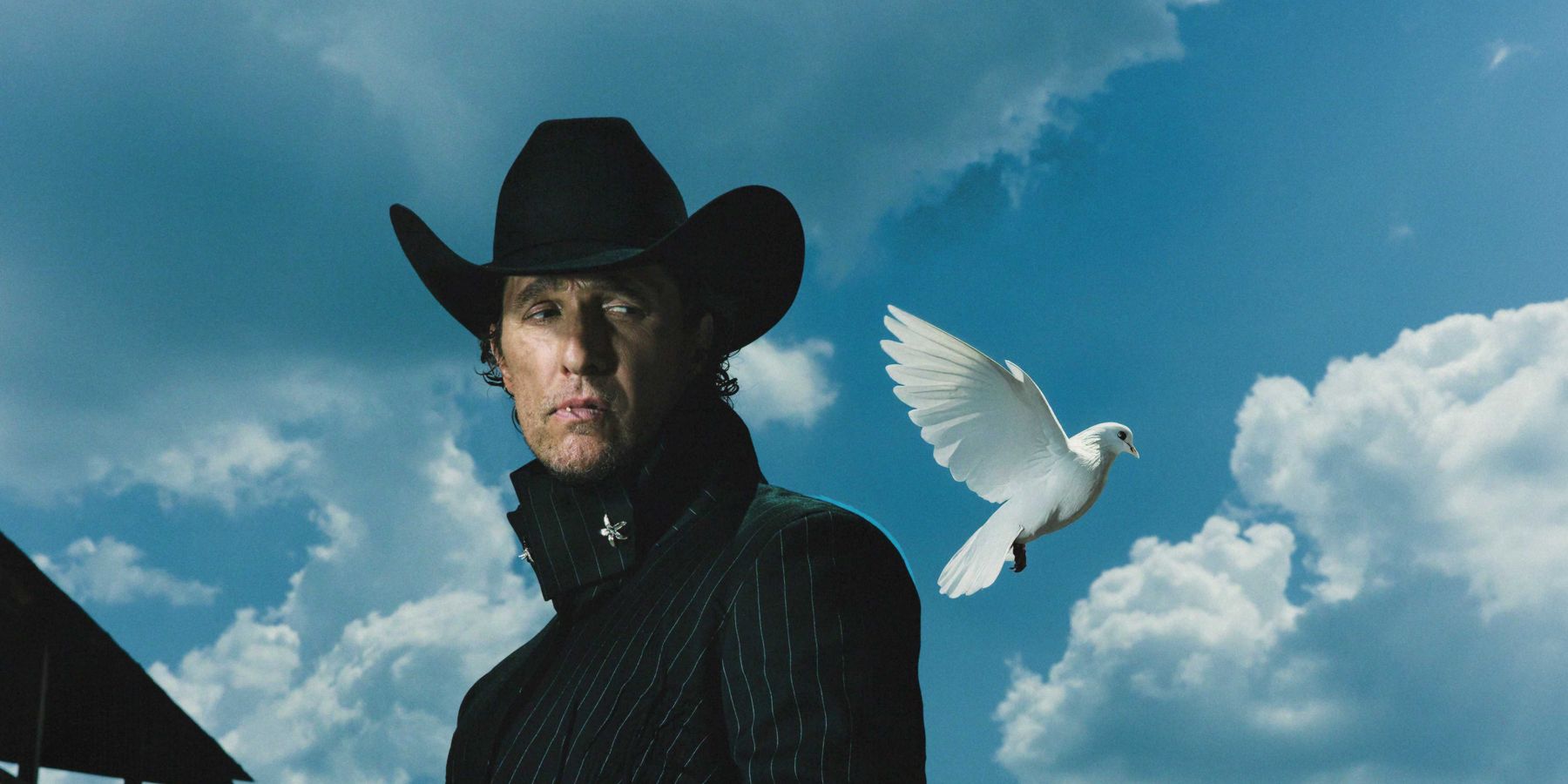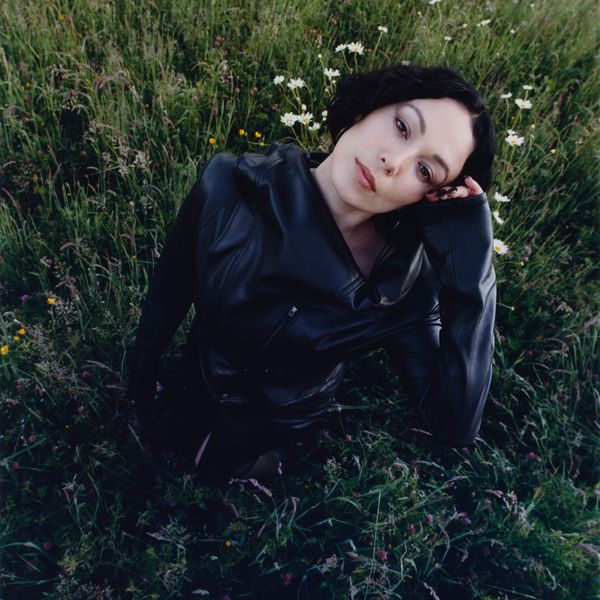
Kelly Lee Owens, Version 2.0
By Ivan Guzman
Oct 30, 2024When Kelly Lee Owens was 17 years old, she stumbled into a job as an auxiliary nurse at a cancer treatment hospital. It wasn't the typical route for a high school student looking for their first full-time job. The role required Owens to quite literally talk patients through their own deaths.
“I don’t know where that comes from in me,” she tells PAPER. With 12 weeks of paid leave, she would throw indie music festivals on the side, and ultimately it was the patients who encouraged Owens to pursue music rather than medicine. “You don’t want to be at the end of your life having regretted not saying something or not doing something, because I saw people who did have those regrets and it felt like it was tortuous for them.”
With this perspective, Owens moved to the big city in the early aughts to pursue her dreams. The DJ and producer has become known the past decade or so as an exciting player in the dance and electronic sonic space, but her new record, Dreamstate, is a monumental leap in the direction of potential pop stardom. Having opened up vocally and lyrically on this album in a way she never has, Owens credits her unique upbringing and life experiences for this new "Kelly 2.0."
Dreamstate is the first release on dh2, the new electronic music imprint on Dirty Hit spearheaded by The 1975’s George Daniel. The album signals a new start for Owens, who has been quietly putting in the work as a DJ and solo artist for some time now. With this record, she’s ready to finally put herself out there in a fully-formed fashion, completely unapologetic.
Below, PAPER sits down with Owens to discuss music listening habits, death doulas and Ariana Grande.
How do you feel about your new album being released into the world?
A little bit scared just because there are a couple of tracks on there that are a little bit more vulnerable than I've been before and quite direct in terms of my feelings. So I'm a little bit nervous about that, but then also just excited because I feel like I'm about to kick off this new phase. It feels like the beginning of something, like a little 2.0 era. Everything coming into color with the cover. It just feels like the beginning of something, so I'm excited.
How does this record feel different compared to your past work? What does Kelly Lee Owens 2.0 look like?
I think just entering a pop state a bit more than I had before. Entering that world and songwriting in a more visceral sense, and being unapologetic about that. I grew up in the '90s, and really, pop music was the thing I listened to first. That's the beginning for me, and it's just come around that natural place now where dance and electronic music happens to be more pop than ever. I also happen to be there in terms of my frame of mind and what I'm listening to and what I'm interested in creating. Generally, as you move through time, you hopefully become more self-assured. I feel you can hear that in the production and in the vocals, just being a little bit more bold and like, ‘Here I am.’ Putting myself out there in a way that sometimes is super vulnerable, but also is rewarding, you know?
Yeah. You have to put yourself out there and be a little uncomfortable to achieve what you want and reach the other side.
Yeah, for the growth, right? I think with anything you do in life, that's what it's about. It's jumping and leaping into the voids and having no idea where you're going to land, but trusting that if that's what you really feel you want to create or do, you actually know that you need to go there. So I'm just always following that feeling wherever that takes me.
The new album is so good. I just got back to New York and feel like it’s a really good walking-down-the-street album.
That’s so nice to hear. I love to hear where people like to listen to it, and I actually think for this one, movement is important in the listening. I don’t know why.
What are your listening habits like? I’m always interested in an artists' relationship with music when they’re not creating their own.
It’s interesting because when I'm not creating, I'm very open. It literally depends on how I feel when I wake up. I mean, also I have to say because it's my job to listen so much, and even when I'm DJing, my ears get so tired. So believe it or not, in my house here, I've only just got a single speaker, because I created this purposeful space where I would come home and have it as a place away from music and just leave that for the studio. Which might sound really odd to people, but I hooked up a speaker the other day. I was like, ‘Oh, actually, this is so nice.’ And I was listening to a lot of folk music, actually. I love Nick Drake, for example, and I was listening to Bryter Layter. It's just one of my favorite albums ever. So at home, maybe more chill. And then for walking around, actually podcasts, but also more upbeat, energetic dance music. Then sometimes Radiohead if I want to cry. So yeah, when I'm actually making an album, I can't really listen to music. I think that is quite common for a lot of artists.
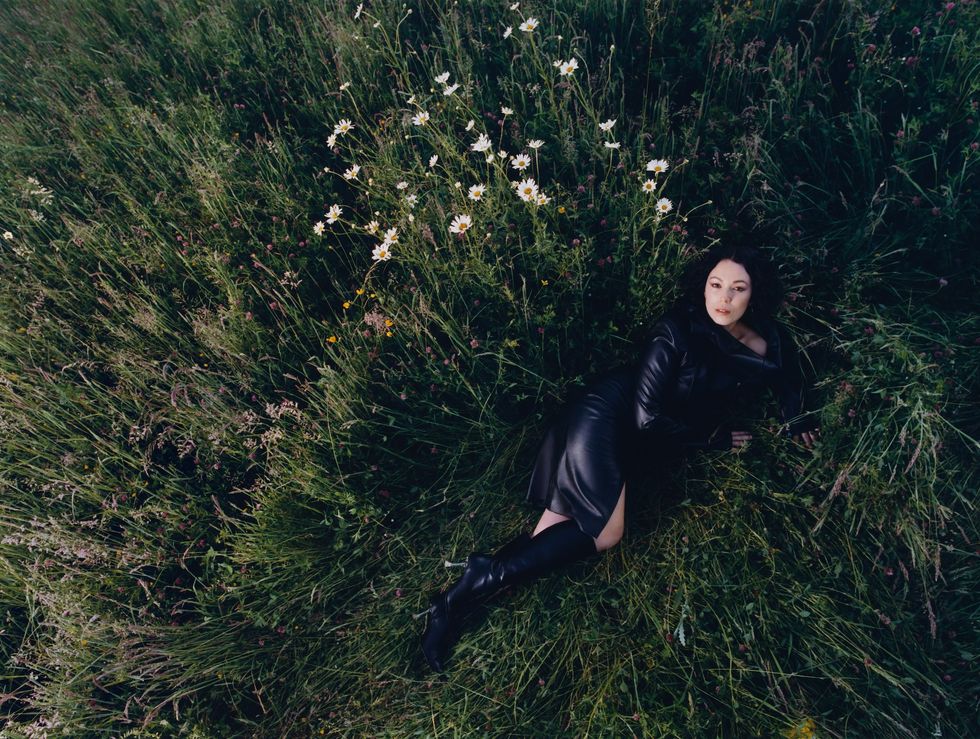
That’s interesting. I wonder what the difference is when you decide to listen to a podcast versus music, because I’m the same way.
Honestly, the other day, I just wanted to be told a story. I feel like podcasts are so comforting in that way, and music comforts you in another way, depending on what you need. When I first wake up, it's like I want to be told a story, and I want to go grab my coffee and just ease myself into the day. And then I had a kind of surreal moment [the other day] because I'm obsessed with food, and there's a podcast called Dish. I met the guy who runs that podcast, and then he mentioned me on the podcast. It was a very surreal out of body experience where I was like, ‘Oh, okay!’
Yeah, this morning I woke up and just felt the urge to listen to Mariah Carey in the shower.
I love that. Did you sing your heart out? Was it that kind of vibe?
No, I just listened to this one live performance of “We Belong Together.” I felt like I had to in that moment.
Also, that’s another thing for me. Singing is so cathartic, and I didn’t realize just how cathartic [it can be]. If I don’t sing for more than a week, I feel so weird. I think it’s about breath control. It’s actually a very therapeutic way to get you into a breath state that actually really calms your nervous system. So sometimes you just need to sing as well.
Something that fascinated me was that you worked in a cancer hospital in your teens and had this audience there who told you to work in music. Can you tell me about that time in your life?
The more I look back on this, the crazier it feels. First of all, it started at 17. I went straight from school to a nursing home across the road because I'm a dreamer on one level, and then in other ways, I'm very practical. I was like, ‘Okay, I want to do music, but I don't quite know how yet. Until then, maybe I'd love to do medicine or nursing, but in order to do that, can I deal with death?’ I don't think that's a question many 17-year-olds ask themselves. But I was like, I'm going to have to be very practical about this and be around it in order to know. So there was a nursing home that was literally across the road from the high school that I went to, and I started working there full-time at 17. I was talking people through their deaths, very naturally somehow. I don't know where that comes from in me. Then I went to move to Manchester, and it was simultaneously for music and for a job. That was Christie's cancer hospital, and I loved both.
You had 12 weeks paid leave. So I used to just go on tour with my friends’ bands and help out and put on festivals, and then come in and also do this [cancer] job. That perspective on death and being confronted with it every day truly makes you appreciate what you have in the moment, and also allows you to take risk in a way, because you don't want to be at the end of your life having regretted not saying something and not doing something, because I saw people who did have those regrets, and it felt like it was torturous for them. I just promised myself, no matter what it takes and how long it takes, I will make a record of my own. I didn't really know how. I didn't read or write music and hadn't yet learned production. I wasn't aware of how to. I just knew that I had to, though, because I could not be at the end of my life with that weight. So ultimately, all to say, it was absolutely a gift to be given that perspective so young.
That’s amazing. I can’t imagine being 17 and, like you said, talking people through their death. Did you get training for that?
No. And again, that's even crazier when I think about it, right? It's just this thing. I was always very caring and very empathic, I suppose. I could feel other people's pain in a way, and maybe that does blend into the artistry thing where you're just always feeling collectively and individually, which I think is being sensitive in that way. It can be overwhelming, but also can be a sort of superpower. Especially in that job, it helps you to really be there with people through a moment. I just found myself talking them through it, and just being present, but then at the same time, I was always thinking something was missing. I think you can have a good death. And you know, scent is important and sound is important, and we have doulas for birth, but like, where are the death doulas? I know I'm always talking about death, but it is life to me. It's the one thing we know. So let's have these conversations.
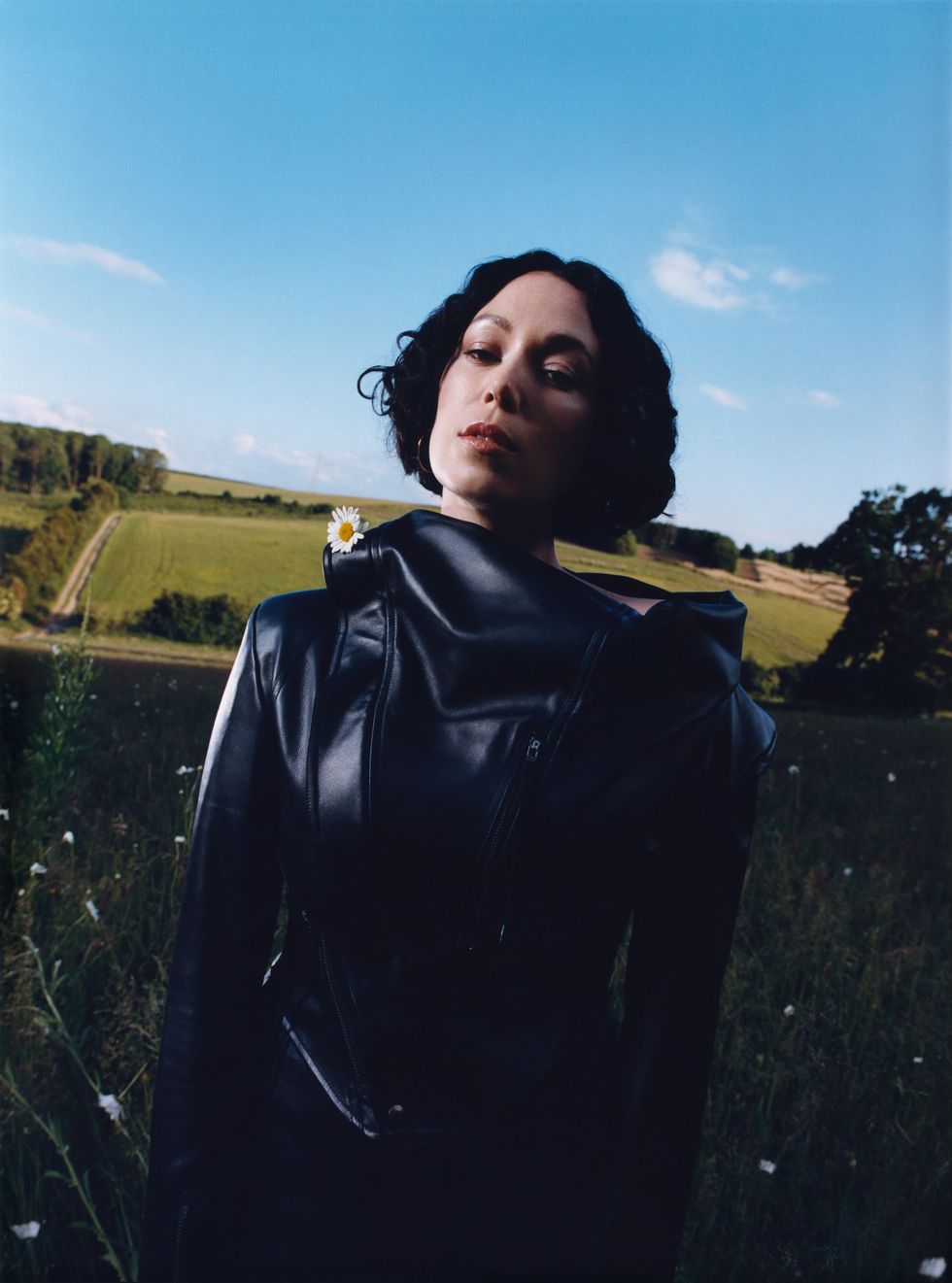
Would you ever go back to that? Say that music is dead, you can’t make music anymore. What would be the occupation that you go to?
I do think so. I think I’d be a death doula. Not necessarily working for the hospital, but having created my own services or integrated them into hospices. I'm sure there's more of that now than ever, I have to say. But you'd have to create a plan, I suppose, and figure out what kind of atmosphere and things you would need to be supported through that transition.
So this record is your first foray into front-facing pop star-esque type stuff. What are your thoughts on this year’s obsession with the mainstreamification of club music, obviously with Charli xcx and everything?
Well, firstly, I just think whatever brings people together and the most amount of people together can only be a good thing. When I grew up, actually, in the '90s, I do remember hearing the Chemical Brothers, for example. They could be number one, they were in the charts. Incredible electronic music and lots of acid and stuff being on top of the pop charts, you know? So actually, that was my first example of what pop music could be, and it was really good. I've always longed for that to come around again, because, for a while, pop music to me was super formulaic in a way that feels soulless. Right now, there's a lot of soul being pumped back into the sort of underground in a way that maybe they can then come through to be popular. And obviously Charli is leading that pack at the moment. If she brings other people up with her, then great, because that's what it's about. Dance music is rooted in community, ultimately, and that's the thing. I have a crossover now. I did, for example, Boiler Room the other day, and I had my fans, I had George's fans, I had Charli's fans. What made me so happy was there are people there who are in their 50's, who have seen it all and done it all. And then there are these kids who, this is their first foray into clubs and the culture, and they're so overjoyed to be there. Those people in a room together, that is what I love. That is exciting to me, because sometimes there’s this generational thing where there's so much division and separation. We're always finding ways to be like, I'm this generation, I'm that and I'm different than you. It's just so boring to me. The best and happiest things happen when generations find what they have in common. If that's the club, then that's amazing.
Who’s your favorite pop star of all time?
Oh my God, like pop pop? That’s such a good question. It might be Beyoncé. Especially for me it’s more the latter half of her career. I know some of the producers she’s worked with like BloodPop, who I’ve also written with. And then Renaissance. Actually, this year I was obsessed with Eternal Sunshine by Ariana Grande. She's working with Max Martin, he's worked with Robyn and there's a lot of dance influences there. I find myself singing the tracks and being like, God, maybe I could write for her. This is sick.
I feel like a lot of underground artists love Ariana Grande. I don’t know why.
It does sometimes feel like that. But then, I also just thought about who I loved when I was growing up, and it was Aaliyah. I know that was R&B pop, but it was pop with Timbaland production. She was my icon, everything from wearing black leather and dark clothes and the shades. She had swag for days, and also just had the dark edge. I feel like that's what I would want to bring to pop music. We need that dark and light.
What was the most difficult track on this album to make?
There are two things that come to mind. One of them is a track called “Rise” with Bicep, and it's the one that, for me, is almost an outlier. With the vocals, I wasn't sure whether to keep them as the rest of the album is — very upfront — or to have the vocals almost just be an instrument and an element that exists around the sound. So I was a little bit insecure about that track for a while, and then I sent it to either Xavier from Justice or Martin Gore from Depeche Mode, and one of them was like, ‘This is my favorite track on the album.’ And it just gave me so much confidence to be like, ‘Oh, okay, there's a vibe.’ There's a world that it's created. But that one took me a long time. I even thought about removing the vocals at one point. So some take longer than others to let you know what they require, I suppose.
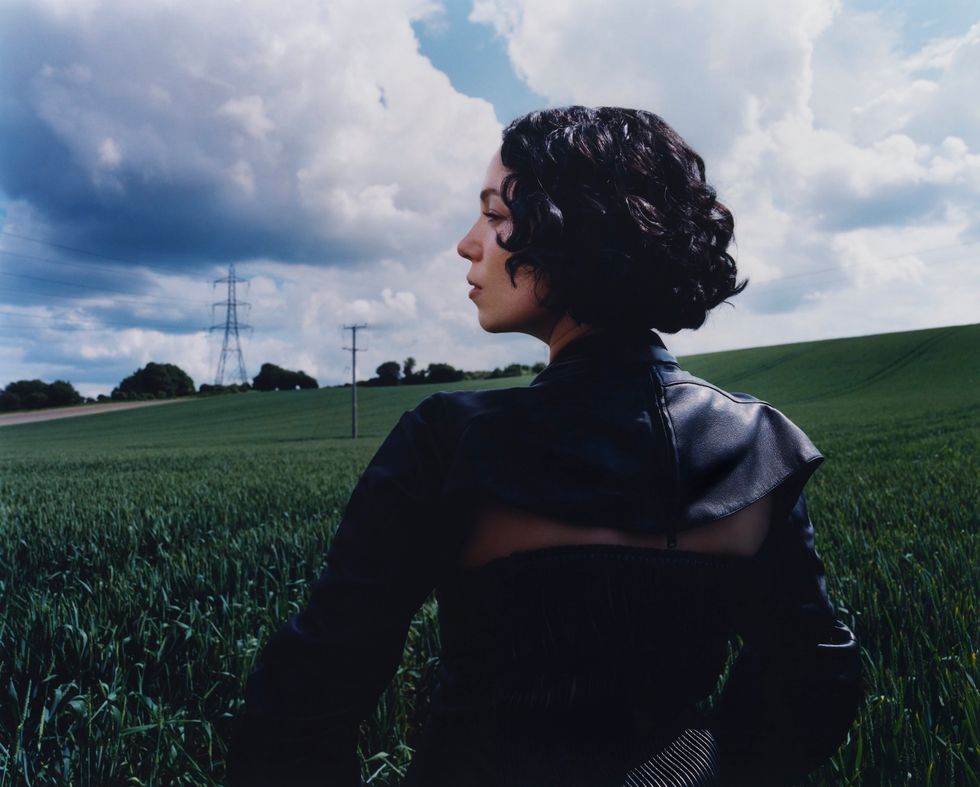
What was the best part about growing up in North Wales?
I just think the people. It’s like when people talk about salt of the earth people. It's the same thing as dance music — it’s based on community. Opposite my grandmother's house, we had Bob the farm. [In North Wales], you're known by what you do, so it was Bob the farm. Don't even know his second name, and I knew him my whole life. He would grow potatoes, and he would deliver a sack. You just wake up, and there would be a sack of potatoes outside your house. People would just help each other out. I just thought that was normal, you know, people just giving to each other constantly and consistently. And then, obviously, when you move to a city, it’s a bit of a culture shock that that isn't always the way. But then also, it is just so idyllic. I grew up playing with wild kittens, like feral kittens in a barn, you know? And baby bunnies. And I just thought that this was normal. I was riding horses from the age of two, bareback. It was wild. There's a wild thing there for your spirit. So it's a very beautiful, grounded, yet ethereal place to grow up. We love songs. We love poems. We have choirs. It’s like a national service that everyone's in a choir whether you can sing or not, you know? And then they sort of filter you out, but expression via song is super important. So that probably set me up for a lot when it comes to music.
I think you can feel that on Dreamstate. You kind of tapped into that ethereal, dreaming sensibility.
Yeah, you're right. There was space to dream. That's the other thing, the literal space to dream, which is so important.
What’s your favorite place to play live?
Oh my gosh. There are so many different places. I mean, just playing in Manchester the other day. Honestly, Northern crowds are wild and it felt like a homecoming because I lived there for a few years. But I will say, one place that stands out is Mexico City. I got to play at Foro Sol for 70,000 people a night three times in one week with Depeche Mode and the fans there are just so obsessive. But in the sense that they love and adore music so much, and they treat people who create it like royalty. I've never seen anything like it, and I just love the culture and the food and everything's colorful. I feel so happy when I'm there.
Any random fun facts about you that people would be surprised to know?
I don’t think they would be surprised about this, but more and more, I’m reading tarot. I don’t think anyone would be surprised by that kind of witchy, ethereal, techno energy. But maybe that will become another avenue at some point.
I could see you growing old and becoming a tarot reader.
Yeah, I’d love that for me. A death doula tarot reader. I mean, that sounds fabulous to me.
Photography: Samuel Bradley
From Your Site Articles
Related Articles Around the Web
MORE ON PAPER
ICONOS: Pepe Aguilar, El Oficio del Tiempo, la Voz del Silencio y el Peso del Legado
Español
Jan 19, 2026
Entertainment
Cynthia Erivo in Full Bloom
Photography by David LaChapelle / Story by Joan Summers / Styling by Jason Bolden / Makeup by Joanna Simkim / Nails by Shea Osei
Photography by David LaChapelle / Story by Joan Summers / Styling by Jason Bolden / Makeup by Joanna Simkim / Nails by Shea Osei
01 December
Entertainment
Rami Malek Is Certifiably Unserious
Story by Joan Summers / Photography by Adam Powell
Story by Joan Summers / Photography by Adam Powell
14 November
Music
Janelle Monáe, HalloQueen
Story by Ivan Guzman / Photography by Pol Kurucz/ Styling by Alexandra Mandelkorn/ Hair by Nikki Nelms/ Makeup by Sasha Glasser/ Nails by Juan Alvear/ Set design by Krystall Schott
Story by Ivan Guzman / Photography by Pol Kurucz/ Styling by Alexandra Mandelkorn/ Hair by Nikki Nelms/ Makeup by Sasha Glasser/ Nails by Juan Alvear/ Set design by Krystall Schott
27 October
Music
You Don’t Move Cardi B
Story by Erica Campbell / Photography by Jora Frantzis / Styling by Kollin Carter/ Hair by Tokyo Stylez/ Makeup by Erika LaPearl/ Nails by Coca Nguyen/ Set design by Allegra Peyton
Story by Erica Campbell / Photography by Jora Frantzis / Styling by Kollin Carter/ Hair by Tokyo Stylez/ Makeup by Erika LaPearl/ Nails by Coca Nguyen/ Set design by Allegra Peyton
14 October
Entertainment
Matthew McConaughey Found His Rhythm
Story by Joan Summers / Photography by Greg Swales / Styling by Angelina Cantu / Grooming by Kara Yoshimoto Bua
Story by Joan Summers / Photography by Greg Swales / Styling by Angelina Cantu / Grooming by Kara Yoshimoto Bua
30 September




